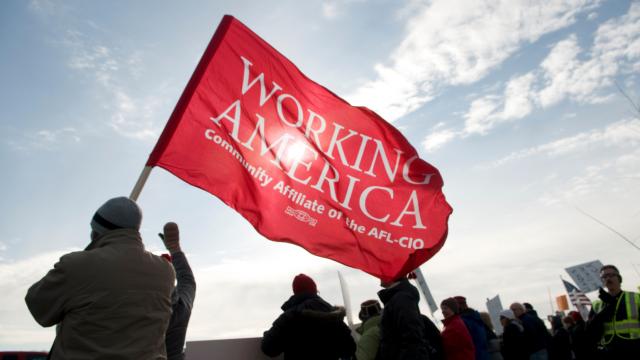
Conference at UCSB to Examine the Labor Movement in America
The decline of organized labor’s influence in the U.S. can be summed up in two numbers: 35 and 6. The first is the percentage of unionized private-sector workers at its high in the 1950s. The second is the current percentage.
What might be done to reverse that decline will be the focus of a two-day conference April 25 and 26 at UC Santa Barbara. Hosted by UCSB’s Center for the Study of Work, Labor, and Democracy, “The American Labor Movement: Crisis and Creativity” will begin at 8 a.m. Friday in the multipurpose room of the Student Resources Building. Saturday’s events will take place in the University Center’s State Street Room beginning at 8:30 a.m. The conference is free and open to the public.
“The trade union movement in America is in extremely big trouble, and it requires some new, creative thought,” said Nelson Lichtenstein, MacArthur Foundation Professor of History and director of the center. “And sometimes this can be done much better on a college campus.”
The conference will bring together a mix of academics and labor officials for what Lichtenstein described as “freewheeling discussions” and debate on a number of topics in six sessions over the two days. “They’re trying to find new ways to be relevant, to organize, to raise wages, to stop inequality,” he said.
Among featured speakers are Will Jones, Larry Cohen and Jake Rosenfeld. Jones, professor of history at the University of Wisconsin-Madison, will deliver the keynote address on Friday. His topic will be “Labor’s Vital Role in the 1963 March on Washington.” He will give a separate talk on Thursday, April 24, at 4 p.m. in UCSB’s MultiCultural Center Theater.
His lecture, “The March on Washington: Jobs, Freedom, and the Forgotten History of Civil Rights,” is part of this year’s Critical Issues in America series, “The Great Society at Fifty: Democracy in America 1964/2014.”
Cohen, president of the Communication Workers of America, chair of the AFL-CIO’s organizing committee and founder of Jobs for Justice, will speak Friday at noon.
Rosenfeld, who will participate in a panel discussion beginning at 8:30 a.m. Friday, is an associate professor of sociology at the University of Washington and the author of “What Unions No Longer Do,” which studies labor’s decline and its impact on society. Particularly hard hit are minorities and immigrants, Lichtenstein noted.
“One of Rosenfeld’s most important findings is that when private sector unions decline ¾ and they’re down to 6 percent of the of the whole workforce ¾ the impact it’s had politically is that Latino and immigrant and African Americans have much, much less political voice,” Lichtenstein said. “We’ll have a session about him and his findings and what to do about it.”
The conference is co-sponsored by Jacobin magazine and the National Union of Healthcare Workers.



